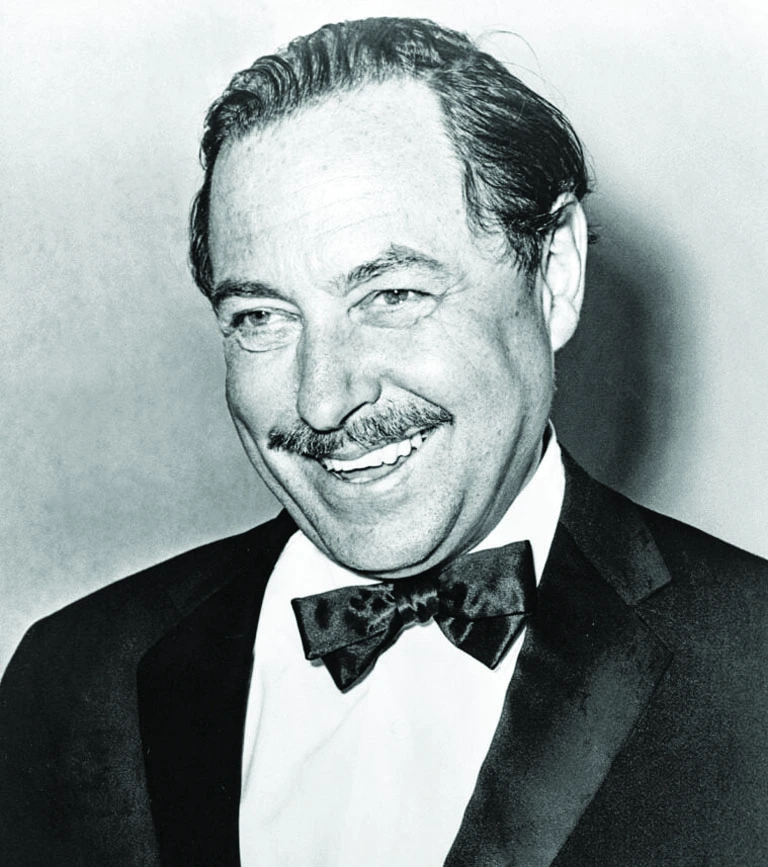
Tennessee Williams
March 26, 1911
February 25, 1983
He was brilliant and prolific, breathing life and passion into such memorable characters as Blanche DuBois and Stanley Kowalski in his critically acclaimed A Street Car Named Desire. And like them, he was troubled and self-destructive, an abuser of alcohol and drugs.
He was awarded four Drama Critic Circle Awards, two Pulitzer Prizes and the Presidential Medal of Freedom. He was Tennessee Williams, one of the greatest playwrights in American history.
The tragic poet Hart Crane was one of his early influences, but as a playwright, it was Henrik Ibsen who had the greatest impact on him. Williams learned the Scandinavian literary dialect used by Ibsen to better understand his plays.
Born Thomas Lanier Williams in Columbus, Mississippi in 1911, Tennessee was the son of a shoe company executive and a Southern belle. Williams described his childhood in Mississippi as pleasant and happy.
But life changed for him when his family moved to St. Louis, Missouri.
The carefree nature of his boyhood was stripped in his new urban home, and as a result Williams turned inward and started to write. His parent’s marriage certainly didn’t help. Often strained, the Williams home could be a tense place to live. “It was just a wrong marriage,” Williams later wrote.
The family situation, however, did offer fuel for the playwright’s art. His mother became the model for the foolish but strong Amanda Wingfield in The Glass Menagerie, while his father represented the aggressive, driving Big Daddy in Cat on a Hot Tin Roof.
Throughout his life Williams remained close to his sister Rose who was diagnosed with schizophrenia as a young woman.
In 1943, as her behavior became increasingly disturbing, she was subjected to a lobotomy, unfortunately with disastrous results, and was subsequently institutionalized for the rest of her life. Cornelius and Edwina Williams had permitted Rose to receive the lobotomy which incapacitated her.
Williams was haunted by his sister’s tragedy for the rest of his life, and never forgave his parents for authorizing the operation. The devastating effects of Rose’s illness may have contributed to Williams’alcoholism.
Williams spent a number of years traveling throughout the country and trying to write. His first critical acclaim came in 1944 when The Glass Menagerie opened in Chicago and went to Broadway.
It won a New York Drama Critics’ Circle Award and, as a film, the New York Film Critics’ Circle Award.
At the height of his career in the late 1940s and 1950s, Williams worked with the premier artists of the time, most notably Elia Kazan, the director for stage and screen productions of A Streetcar Named Desire, and the stage productions of Camino Real, Cat On A Hot Tin Roof, and Sweet Bird Of Youth.
Kazan also directed Williams’ film Baby Doll. Like many of his works, Baby Doll was simultaneously praised and denounced for addressing raw subject matter in a straightforward realistic way.
The 1960s were perhaps the most difficult years for Williams, as he experienced some of his harshest treatment from the press. In 1961 he wrote The Night Of The Iguana, and in 1963, The Milk Train Doesn’t Stop Here Any More. His plays, which had long received criticism for openly addressing taboo topics, were finding more and more detractors.
Around this time, Williams’ longtime companion, Frank Merlo, died of cancer. He began to depend more and more on alcohol and drugs and though he continued to write, completing a book of short stories and another play, he was in a downward spiral. In 1969 he was hospitalized by his brother.
After his release from the hospital in the 1970s, Williams wrote plays, a memoir, poems, short stories and a novel. In 1975 he published Memoirs, which detailed his life and discussed his addiction to drugs and alcohol.
In 1980 Williams wrote Clothes for A Summer Hotel, based on the lives of Zelda and F. Scott Fitzgerald. Only three years later, Tennessee Williams died in a New York City hotel filled with half-finished bottles of wine and pills.
It was in this desperation, which Williams had so closely known and so honestly written about. His genius was in his honesty and in the perseverance to tell his stories.